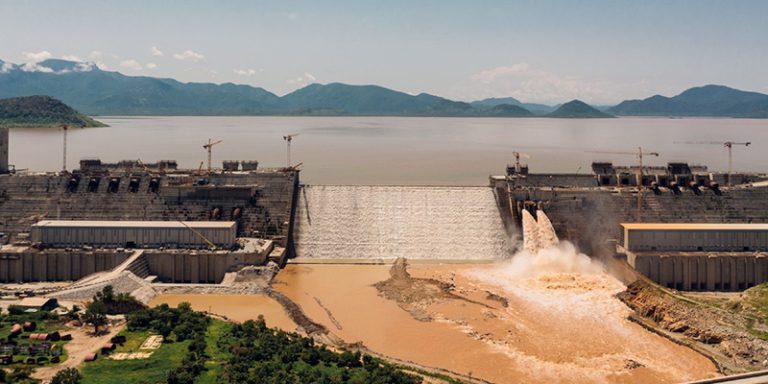
On July 19, Ethiopia announced that it had completed the second filling of the Grand Ethiopian Renaissance Dam (GERD). This unilateral step had been rejected by the downstream countries, Egypt and Sudan, which insisted on a binding agreement with Ethiopia before it completed filling of the dam. The Ethiopian move added fuel to the stalled negotiations between the three countries and underscored the fact that reaching an agreement over the filling and operation of the dam remains elusive. This stalemate raises several questions about Egypt’s options in dealing with Ethiopia’s unilateral moves and Cairo’s ability and readiness to face the consequences of GERD becoming a reality.
Endless Negotiations
During the past six years, negotiations between Ethiopia, Sudan, and Egypt failed to produce a binding agreement that could meet the demands of all parties with regard to the filling and operation of GERD. On March 23, 2015, the three countries signed the Declaration of Principles which set in motion the goal of “Cooperation based on mutual understanding, common interest, good intentions, benefits for all, and the principles of international law.” However, multiple rounds of negotiations among diplomatic and technical delegations from the three countries could not reach an agreement. This widened the gap of mistrust and dispute between Ethiopia, on the one hand, and Egypt and Sudan, on the other. The last round of negotiations was held on April 6 in Kinshasa, the capital of the Democratic Republic of the Congo, but produced no progress. Cairo and Khartoum blame Addis Ababa for the failure of the negotiations, a reality that only got worse with the latter’s filling of the dam.
There is a common belief among Egyptian and Sudanese officials that Ethiopia is not serious about GERD negotiations and that it is only trying to buy time until it finishes the construction and filling of the dam.
There is a common belief among Egyptian and Sudanese officials that Ethiopia is not serious about GERD negotiations and that it is only trying to buy time until it finishes the construction and filling of the dam. This was indicated by Egyptian Foreign Minister Sameh Shoukry, who criticized Ethiopia’s intransigence and held Addis Ababa responsible for the failed negotiations. As he put it in his speech before the UN Security Council on July 8, “After a year of abortive negotiations and despite the tireless efforts of the Chairpersons of the African Union and our international partners …… we find ourselves – again – confronted by the reality of the unilateral execution of the filling of the dam without an agreement to protect downstream communities against the dangers of this dam.” Shoukry added that “[T]his blatant act of unilateralism is not only a manifestation of Ethiopia’s irresponsibility and its callous indifference to the damage that the filling of this dam could inflict upon Egypt and Sudan …… but it also illustrates Ethiopia’s bad faith and its attempt to impose a fait accompli in defiance of the collective will of the international community.”
Similarly, Sudan’s Foreign Minister Mariam Alsadig Almahdi voiced outrage following Ethiopia’s announcement of its decision to initiating the second filling of GERD . She considered it “a clear violation of international law and the Declaration of Principles, and an imminent danger and threat to Sudan.” Despite different assessments between Cairo and Khartoum on the dangers of GERD (they have different water allotments of and uses for the water), both countries have drawn closer over the past few months in order to collaborate and coordinate their position regarding Ethiopia’s steps. However, this alignment is viewed by Ethiopia as directed against its interests, which adds more distrust and complication to an already difficult situation.
Issues of Discord
The differences between Ethiopia, on the one hand, and Egypt and Sudan, on the other, regarding GERD revolve around three main issues. The first is reaching a legally binding agreement among the parties over filling and operating the dam, one that would allow them to work collectively. But this is what Ethiopia rejects, as it considers that any binding accord means interfering in a sovereign matter. It also believes that there is no need for another agreement in light of the Declaration of Principles and is convinced that the guiding ingredients contained therein are sufficient. For their part, Egypt and Sudan want to make sure that their shares of Nile River water will not be impacted by the filling and operation of GERD, especially during drought years. However, Ethiopia refuses to sign any binding agreements that stipulate or recognize these shares.
The second issue is the discord over the legal reference that can be invoked in the event of a dispute between Ethiopia and Egypt and Sudan. The Declaration of Principles did not provide a specific mechanism for resolving future disputes. While Ethiopia insists on the African Union as a mediator in negotiations, Egypt and Sudan want to include others such as the European Union, the United Nations, and the United States—which Ethiopia rejects. Third is the dispute over the filling and operation of the dam during drought years, which is a critical point for Egypt precisely because it suffers from great water scarcity. Failure to agree on the passage of a certain percentage of water may lead to catastrophic results for Egypt.
One of the strategic mistakes that Egypt has made was President Abdel-Fattah el-Sisi’s signing of the Declaration of Principles, which essentially gave Ethiopia a blank check to control the waters of the Nile River.
In fact, one of the strategic mistakes that Egypt has made was President Abdel-Fattah el-Sisi’s signing of the Declaration of Principles, which essentially gave Ethiopia a blank check to control the waters of the Nile River—before concluding a binding agreement with the downstream countries. The broad and unclear wording of the accord is one of the main reasons that got Egypt into this predicament. In addition, Ethiopia seems to be exploiting that declaration in order to repudiate what Egypt and Sudan consider as their historical rights in the waters of the Nile River, which were agreed upon in the last century. In fact, Ethiopia does not recognize the agreements of 1902, 1929, and 1959, all of which preclude the construction of any dams or projects on the Nile that might impact the flow of water to the downstream countries Egypt and Sudan. Ethiopia considers these agreements as nonbinding as they were signed during the colonial era.
Catastrophic Consequences and Limited Options
In light of the failure of the Kinshasa negotiations in April, Egypt and Sudan have urged the international community to intervene to try to find a solution to the GERD crisis before it escalates and leads to further regional instability. They also called on the UN Security Council to take action to prevent Ethiopia from unilaterally filling the dam without a binding agreement with the downstream countries.
On July 8, the Security Council held an emergency session to discuss the issue of GERD. Egypt and Sudan attempted to push members to adopt a Tunisian resolution that would force Ethiopia to stop the second filling of the dam. Their attempt failed, however. The Security Council did not put forth a decision or statement to endorse their demand; rather, it referred the matter to the African Union. A few days later, Ethiopia announced that it completed the second filling of the dam.
Without an accord among the three parties, the consequences of the unilateral filling and operation of GERD will be catastrophic on the downstream countries. According to a recent study, Egypt in particular would face unprecedented challenges due to water deficit. A report about the study points out the following:
As a result, the Egyptian agricultural area faces a potential decline by an alarming rate of up to 72%, whilst the national product per capita in Egypt is expected to decrease by up to 8%. This would, in turn, see the unemployment rate potentially reaching 25%, according to the worst scenarios presented by the study. This may lead to a state of social and economic instability, and a possible increase in the movement and migration, both internal and external.
Similar fears were echoed by Egypt’s ambassador to the United States, Motaz Zahran, who warned of Ethiopia’s filling of GERD without having concluded an agreement with the downstream countries. According to Zahran, “If unilaterally filled and operated, the GERD could inflict incalculable socioeconomic and environmental harm downstream in Egypt and Sudan.”
Accepting the Bitter Reality?
Despite the damage expected from the completion of the filling of the dam, it seems that Cairo is dealing with the matter as if it is a reality that cannot be changed. Perhaps this explains the statements of Egyptian officials regarding reducing the risks for Egypt of the second filling. They have also announced preparations to face any shortage that may occur in Egypt’s share of Nile waters, which amounts to about 55.5 billion cubic meters, including reducing agricultural crops that consume a lot of water (such as rice), desalinating sea water, and recycling sewage.
Furthermore, it seems that President Sisi, who warned Ethiopia of a potential conflict over GERD and considered Egypt’s share of the Nile River as a national security issue and “a red line that cannot be crossed,” has begun to accept the fait accompli. He recently tried to assuage Egyptians’ fears regarding the risks of failed GERD negotiations and called on them not to worry. In addition, the pro-regime newspapers and media outlets downplayed1 the effects of the second filling of the dam in order to relieve public anger. Egyptians hold Sisi accountable for failing to preserve Egypt’s rights to the Nile River and blame him for signing the Declaration of Principles, an agreement that allowed Ethiopia to control Egypt’s rights to the waters of the Nile. For example, a prominent Egyptian journalist, Abdel Nasser Salama, vehemently criticized Sisi after Ethiopia announced the completion of the second filling of the Renaissance Dam. He even called on Sisi to step down and blamed him for Egypt’s “heavy defeat” by Ethiopia. Unsurprisingly, several days later, Egyptian security forces arrested Salama and charged him with “financing terrorism.”
As time passes without reaching a legally binding agreement between Ethiopia, Egypt, and Sudan over the filling and operation of GERD, the relationship between the three countries will remain strained—an imposed new reality particularly for Egypt and Sudan.
1 Source is in Arabic.

